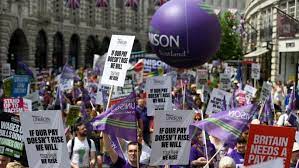On Saturday, tens of thousands of people marched through central London in protest of the UK’s rising living costs.
Huge crowds flocked to London for the event, which demanded that the government do more to assist those whose bills and other expenses are rising faster than their wages.
Boris Johnson, the Prime Minister, has been chastised for his tardy response to the cost-of-living crisis. As a result of Russia’s war in Ukraine, energy and food basics such as wheat have become scarce in the United Kingdom and across Europe. Prior to the war, prices were already rising due to strong consumer demand following the worldwide economic recovery from the COVID-19 epidemic.
Demonstrators carried banners that read, “Cut the war, not the welfare.” According to videos released on social media, they booed as they passed by 10 Downing Street, the prime minister’s residence.
Ben Robinson, who works for a housing charity in Brixton, south London, believes the government is unaware of how bad things will get for the poor.
“We have residents coming into our offices who have to choose between feeding their own children, not themselves, but their own children, and paying rent and heating,” he explained. “That is just not a choice that anyone should have to make, especially in the world’s fourth-largest economy.”
According to the TUC, an umbrella body for labor unions that coordinated the protest, workers have lost about 20,000 pounds ($24,450) in real terms since 2008 because pay hasn’t kept up with inflation.
Johnson’s government is under intense pressure to do more to assist Britons who are trying to make ends meet due to rising gasoline and food prices, as well as rising domestic energy bills. A statistics firm reported that the average cost of filling up a normal family automobile exceeds 100 pounds ($125) as one illustration of the financial squeeze on households.

















